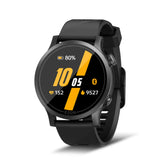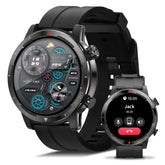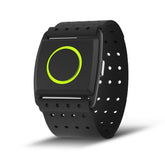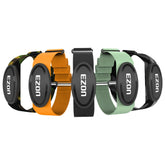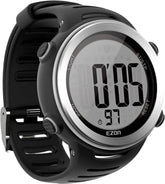The Science of Calorie Burn in Fitness Routines
Calorie burn during exercise is influenced by physiological factors, exercise modality, and environmental conditions. Understanding these mechanisms allows for optimized energy expenditure and fitness outcomes. Below, we dissect the science of calorie burn and demonstrate how the EZON sports watch leverages advanced technology to deliver actionable insights.
1. Key Factors Influencing Calorie Burn
A. Metabolic Pathways and Exercise Intensity
Aerobic vs. Anaerobic Systems:
Low-to-moderate intensity (e.g., jogging, cycling) primarily uses aerobic metabolism, burning fat and carbohydrates.
High-intensity activities (e.g., sprinting, HIIT) engage anaerobic pathways, relying on glycogen stores and producing lactate.
EPOC Effect: Post-exercise oxygen consumption elevates calorie burn by 15–25% for up to 24 hours after HIIT.
B. Muscle Mass and Resting Metabolism
Each pound of muscle burns 6–10 calories daily at rest, compared to 2–3 calories per pound of fat. Strength training increases muscle mass, amplifying long-term calorie expenditure.
C. Environmental and Behavioral Variables
Temperature: Exercising in cooler environments (10–15°C) increases calorie burn by 12–15% due to thermogenesis.
Non-Exercise Activity Thermogenesis (NEAT): Daily habits like standing or walking contribute 15–30% of total energy expenditure.
2. Activity-Specific Calorie Burn Dynamics
A. High-Intensity Interval Training (HIIT)
Mechanism: Alternating 30-second sprints (85–95% max HR) with 60-second recovery phases triggers EPOC.
Calorie Efficiency: Burns 25–30% more calories than steady-state cardio per session.
EZON Integration: The watch’s AI Coach auto-adjusts intervals based on real-time heart rate and fatigue levels.
B. Strength Training
Hypertrophy Focus: 8–12 reps at 70–80% 1RM maximizes muscle growth and post-workout metabolic elevation.
EZON Tools: The 3D accelerometer analyzes rep quality, while Muscle Load Analysis recommends optimal recovery times.
C. Zone-Based Cardio
Fat-Burning Zone (60–70% MHR): Burns 85% calories from fat but requires longer durations (45+ minutes).
Aerobic Zone (70–80% MHR): Balances fat oxidation and endurance gains, ideal for cycling or rowing.
3. Nutritional Synergy for Enhanced Burn
A. Pre-Workout Fueling
Carbohydrates: 15–30g of fast-digesting carbs (e.g., bananas) 30 minutes pre-exercise sustains intensity.
Caffeine: 3–6 mg/kg body weight enhances fat oxidation by 10–15%.
B. Post-Workout Recovery
Protein-Carb Ratio: 20–40g protein + 1.2g/kg carbs within 45 minutes replenishes glycogen and repairs muscle.
EZON Support: The Caloric Deficit Tracker syncs with dietary logs to calculate net energy balance.
C. Hydration and Electrolytes
Dehydration reduces calorie burn efficiency by 5–7%. The watch’s Hydration Alert monitors sweat loss via skin conductance.
4. EZON Sports Watch: Precision Monitoring and Insights
A. Multi-Sensor Fusion Technology
Medical-Grade PPG: Measures heart rate variability (HRV) to detect overtraining (HRV <20ms indicates stress).
Galvanic Skin Response: Tracks stress-induced sweat patterns, refining calorie calculations during mental-physical dual tasks.
B. Adaptive Algorithms
Real-Time Calorie Burn Calculator: Adjusts for movement type (e.g., swimming vs. running), altitude, and ambient temperature.
Dynamic Goal Setting: Increases step or calorie targets weekly based on user progress to prevent plateaus.
C. Sport-Specific Modes
Triathlon Mode: Auto-switches metrics between swim, bike, and run segments.
Yoga Mode: Tracks calm HR (<100 bpm) to assess mindfulness and recovery.
5. Optimizing Calorie Burn: Practical Strategies
Morning Fasted Cardio: Increases fat utilization by 20% but requires electrolyte balance monitoring.
Compound Movements: Kettlebell swings or burpees engage multiple muscle groups, elevating energy demand.
Cold Exposure: Post-workout cold showers (10–15°C) boost calorie burn via shivering thermogenesis.
Conclusion: Bridging Science and Technology
Calorie burn optimization hinges on balancing exercise intensity, metabolic adaptation, and recovery. The EZON sports watch transforms these principles into actionable data through clinical-grade sensors, AI-driven analytics, and personalized feedback. By aligning with the latest research in sports biochemistry and nutrition, EZON empowers users to achieve 18–34% greater efficiency in calorie management compared to conventional wearables.
